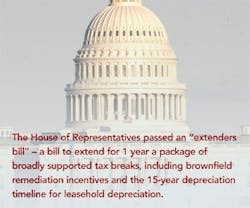When you are overcharged at a store, do you speak up and ask to be treated fairly? When you have a business dispute, do you make sure your objections are on record? Of course! So when Congress is poised to pass legislation that will forever change the way you are taxed, your ability to make a profit, and the future of your profession, do you make sure your voice is heard?
Our U.S. Senators and Representatives are tired of hearing from me; they need to hear from you. And, on Feb. 3, building owners and managers from across the country convened in Washington to meet with their representatives, educate them on the state of the real estate industry, and weigh in on the myriad real estate issues that top Congress’ 2010 agenda. As part of BOMA International’s Winter Business Meeting and National Issues Conference (Feb. 1–4), participants took real estate’s message to Capitol Hill. Based on the likelihood of Congressional action and the potential impact on commercial real estate, the issues (at press time) we took to the Hill were:
1. Energy/Climate Change
Congress is midway in its consideration of sweeping climate change legislation; the House of Representatives has passed legislation, and a similar bill is pending in the Senate. In addition to instituting a cap-and-trade program to curb emissions, energy provisions are included that, if enacted, would set congressionally mandated and extremely aggressive energy efficiency targets for future versions of the building energy codes (for all new construction, additions, and major renovations); drastically increase the federal government’s role in local/state code adoption and enforcement issues; incentivize states to adopt building labeling/disclosure programs to ensure that energy consumption information is available to the public to influence all sale, lease, and financing transactions; and provide financial incentives to help retrofit existing buildings.
It’s a mixed bag for the commercial real estate industry. We must explain to Congress why incentives like tax credits are an effective way to transform the market, and why it is not effective to ratchet up the energy code to the point where new construction is not cost effective.
2. Tax Policy
For the past year, BOMA has been concerned that, in order to have a favorable tax break extended, commercial real estate would have to “pay” for it by a tax increase on carried interest. In December 2009, this is exactly how it played out. The House of Representatives passed an “extenders bill” – a bill to extend for 1 year a package of broadly supported tax breaks, including brownfield remediation incentives and the 15-year depreciation timeline for leasehold depreciation. The “pay-go” is a permanent change to the tax code that would require the “carried interest” of a partnership to be taxed as ordinary income rather than capital gains (currently 15 percent).
BOMA is actively and aggressively working to educate the Senate on why this tax increase would further hamper an already distressed real estate industry. But we could use your help to give a name and a face – of a constituent and a voter – to discourage this tax hike. At the same time, we still need to encourage the Senate to extend the expiring tax provisions – but with other means to finance it.
3. Card Check
BOMA International supports the ability of employees to have the right to choose whether to be represented by a labor organization by way of secret ballot election conducted by the National Labor Relations Board. A secret ballot election ensures a choice free of coercion, intimidation, irregularity, or illegality; however, the democratically controlled House of Representatives and Senate each introduced the “Employee Free Choice Act” – or “card check” bill – at the beginning of the 111th Congress. The House was able to pass similar legislation in 2007; however, the Senate did not have the votes necessary to get a bill through. Under the proposal, a union would become the recognized bargaining agent after persuading a simple majority of the workers to publicly and openly sign a card indicating support for the union. This would effectively eliminate workers’ ability to make the important decision over union recognition in the privacy of a voting booth – free of coercion, intimidation, or inappropriate influence (making the bill’s title, “Employee Free Choice Act,” a misnomer).
Congress needs to be made aware of the real world implications on our industry if this bill is passed. And don’t forget that many members of Congress owe their 2008 election (or re-election) to union support, making them even more desperate for this legislation to go through before the 2010 election cycle heats up, whether or not it’s responsible public policy.
With Care and Feeding, The Grass(roots) Can Be Greener
Can’t join us in Washington? You’re not off the hook. Advocacy can happen right at home. We encourage you, throughout the year, to check BOMA’s Legislative Action Center for calls to action, join your local BOMA association’s government affairs committee, schedule a face-to-face meeting with your legislator(s) during a district work period when they’re right down the street, and show your support for legislators who support our industry.
Karen Penafiel is vice president of advocacy for BOMA International. She can
be reached at [email protected].
For more information on this and other topics, call BOMA International at
(202) 408-2662 or visit www.boma.org.
